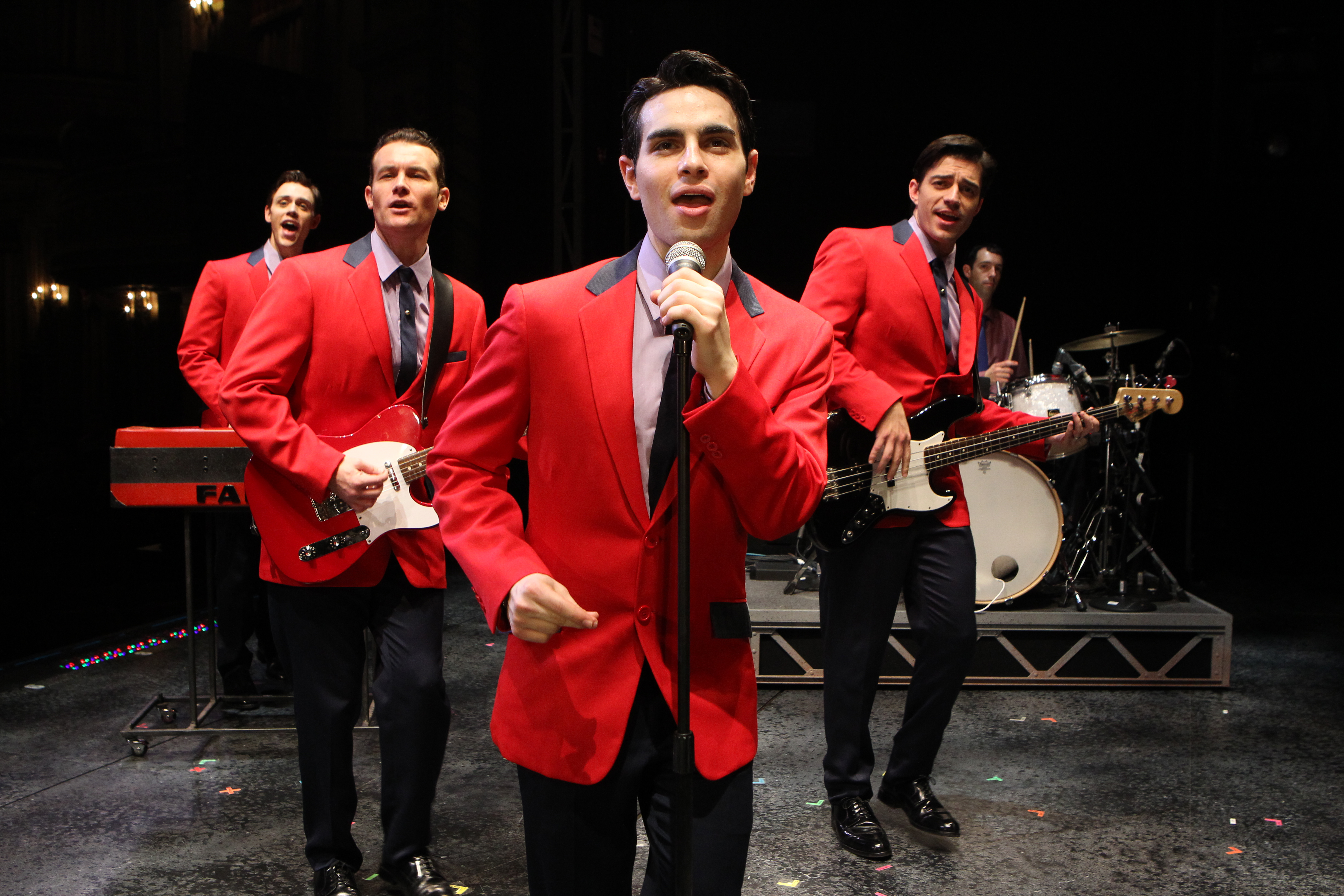PJersey Boys
The 5th Avenue Theatre, 1308 Fifth Ave., 625-1900, 5thavenue.org. $29–$123. Runs Tues.–Sun.; Times Vary. Ends May 4.
In an era that included the Beatles, the Beach Boys, and the music of Motown, Jersey Boys would have you believe that the Four Seasons were a peerless pop phenomenon. Well . . . not exactly. But what the Seasons did have—as put on brilliant display every five minutes in this touring show—is a slew of catchy radio hits and one hell of a mobbed-up history.
As told in round-robin fashion by the group’s four founders (and based on actual interviews), Jersey Boys is the story of runaway egos, Catholic upbringings undone by the sexual revolution, and the singular falsetto of Frankie Valli (Brad Weinstock). With songs and score by original band member Bob Gaudio (former Seattleite Jason Kappus), this 2005 jukebox musical offers the expected hits—“Sherry,” “Big Girls Don’t Cry,” etc. Then there are tales of sudden fame, warring egos, drugs, divorce, and too much time on the road. Ambitious guitarist Tommy (Colby Foytik) initially finances the group via loan sharks (keeping a portion for himself). Once they reach the Top 40, inevitably the mob comes looking to settle old scores.
The two-act show culminates with the Seasons’ 1999 induction into the Rock and Roll Hall of Fame, and Jersey Boys provides a brisk ride through a story not many remember today. The book by Marshall Brickman and Rick Elice is a taut, well-told tale, and Gaudio’s music is surprisingly resilient for its origins in ’50s doo-wop. His songs are crisp as a new tuxedo, expertly performed by the four main actors and their various augmentations, which include video screens and a crackerjack live orchestra. For me, the highlight of Jersey Boys, originally directed by Des McAnuff, is the 1967 hit “Can’t Take My Eyes Off You.”
Still, I have one quibble. The show’s main action is set during the ’60s, but it barely acknowledges that decade’s cultural upheaval. True to their roots as Borscht Belt entertainers, the Seasons were more attuned to casinos and the Catskills. Were they a rock group? To Richard Nixon, maybe. But nostalgia-minded boomers won’t care about such distinctions today. KEVIN PHINNEY
PThe Trial
New Century Theatre Company at Inscape, 815 Seattle Blvd. S., wearenctc.org. $15–$30. 8 p.m. Thurs.–Sat., 7 p.m. Sun. Ends April 28.
Appropriately, the journey starts in a queue in the nondescript hallway of a former immigrant-processing facility. “If you feel drowsy, please sleep. If you feel hot, please sweat . . . ” a neutral voice commands from the PA system. A lab-coated scientist admits you to another antechamber, where you are measured and “sorted” to determine your seating in the steep gallery. Percy Faith’s muzak-y “Theme From A Summer Place” loops as though you’ve been put on hold in hell. Which you sort of have, intentionally, by chronically impressive director John Langs. It’s a perfect welcome to the plight of Josef K, protagonist of Franz Kafka’s 1915 novel, in this new adaptation by Kenneth Albers.
Bank administrator K. (Darragh Kennan), awakens to discover he’s “under arrest” by thugs who may or may not be “official.” The rest of the engrossing 100-minute ordeal follows his search to determine what he’s accused of and how to get himself acquitted of whatever that turns out to be. A parade of bizarre characters roughly correlates to those in the book, but with some differences. Kafka’s jargon-spewing male invalid lawyer here becomes kooky Sophie Kleist (a hilarious, baroque-haired Amy Thone) buzzing about in an electric wheelchair. Kafka’s male painter Titorelli is here fabulously incarnated by Alexandra Tavares as a dominating (and very female) court sculptor. Both she and a fleet of bank secretaries, garbed by Kimberly Newton in fascist-era decolletage, discreetly wear their breasts like torture implements that need only be hinted at occasionally to keep men in line. The secretaries rotate their ankles in hypnotic unison and slap bureaucratic papers around in an empty display of pseudo-efficiency, lest we hope for a second that the world is anything but a bad dream.
Despite anchoring every scene, Kennan keeps his everyman modest, letting the supporting cast outsize him with adamant oddness. (Notable players include Michael Patten, MJ Sieber, Hannah Mootz, and Marty Mukhalian.) Geoff Korf’s interrogational lighting and Robertson Witmer’s sound design further dwarf K. on Jennifer Zeyl’s lean but effective sets. Candelabra and curtains bring a vein of gothic horror into the sterile bureaucratic abstraction. As in the book, don’t expect answers about what happens to Josef K. Paraphrasing Kafka’s notion about God, NCTC’s mood-rich production delivers the nuts, but leaves them for you to crack. Margaret Friedman
E
stage@seattleweekly.com




